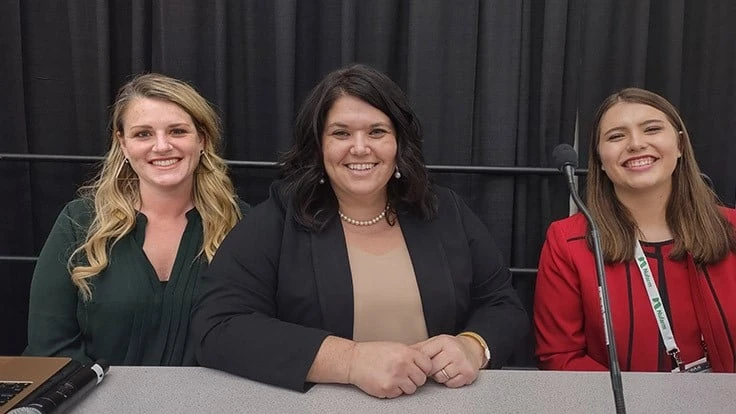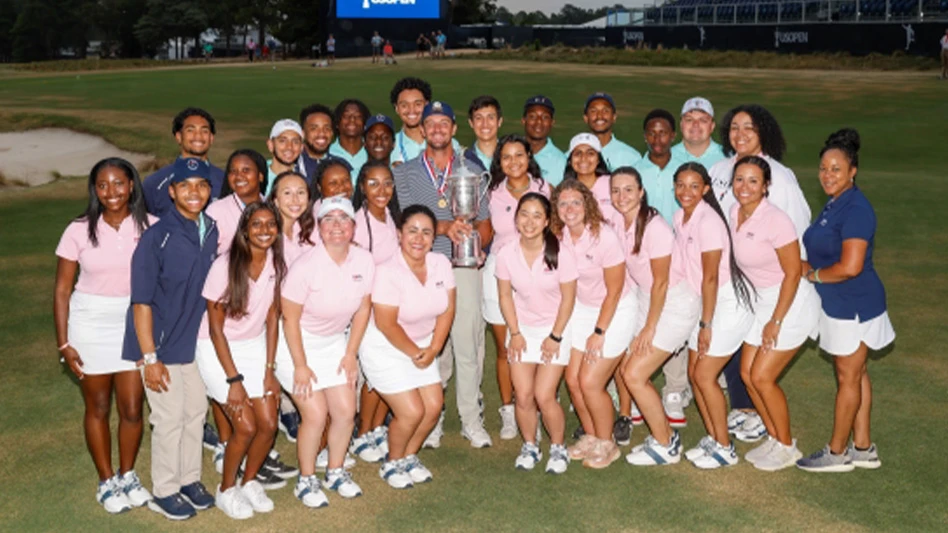
Judd Spicer
First, one attendee stood. Then another, and soon another. Within moments, the conference room filled with standing applause as a smiling Jamie Taylor stepped from the podium.
The first of four panelists to speak at the “Ladies Leading Turf: Mentoring Women” seminar at the 2022 GCSAA Conference and Trade Show in San Diego, Taylor’s potent story of climbing the ranks as a double minority (an African American woman) in the golf trade found instant traction and clapping feedback from a full house of attendees, both female and male.
Echoing the seminar’s sentiment of women working for more opportunity across all aspects of the golf business, the panel, led by Kimberly Gard, territory manager for Syngenta, spoke toward the need for enhanced diversity in the business of the game, ranging from gender to race.
The momentum for golf’s female presence found palpable traction at the 2021 U.S. Women’s Open at Olympic Club in San Francisco, where a collection of women volunteers organically began a growing domino of kinship.
“It (the Open) put us all together to network. There were always small groups doing that, but this put it on a much larger platform to a much larger audience,” said Shelia Finney, senior director member programs with GCSAA, in the moments before the seminar got underway. “Now, on ‘WhatsApp,’ we have a discussion thread, and everybody on there is posting pictures, asking questions, discussing any problems. And we’re networking and supporting one another through this journey. And it’s students, female PhDs in turfgrass, assistant superintendents, women in equipment management and female head superintendents. It’s the whole gamut in the golf industry.”
Finney noted that when she was a head superintendent, she was one of just 54 females in the world with the title; now, in GCSAA alone, there are well over 300 female members.
“I was a golf course superintendent in Tennessee for 25 years. And, to this day, I still believe this: There aren’t more women in golf because they just don’t know it’s a job opportunity,” Finney added. “We as a group feel that by increasing the visibility of women in golf – it’s extremely important to increase the diversity, for ethnicity and gender. If you can’t see yourself there, then you can’t see yourself there. And we believe that we need to change that.”
Assisting in the movement for said increased visibility were fellow panelist: Lorabeth West, assistant director of agronomy at Hillcrest Country Club in Los Angeles; Sally Jones, general manager and golf course superintendent at Benson Golf Club & Cafe in Benson, Minnesota; and Kennedy Ellis, college golfer and aspiring professor of turfgrass.
For Taylor – a LPGA Teaching and Club Professional and former Programs Manager for the LPGA Foundation – the journey of paving new fairways led her to start two business: the Black Golf Directory, “created to elevate and promote African Americans in the golf industry,” and JT Mobile Training, of which she’s CEO, which helps train clients to diversify customer bases.
“My purpose here is to share my story, which I hope will give you a unique perspective and also let you start to think about how you can make a difference at your facility,” Taylor said at the outset of her presentation. “For me, it was to make the biggest impact I’m capable of making, and to venture out on my own.”
Prior to the standing ovation, Taylor told those in attendance that opportunity, if not onus, abounds for expanding golf’s purview.
“Through these companies, I’ve been able to diversify the golf industry,” Taylor concluded. “And I say that you too can do that.”
Judd Spicer is a Palm Desert-California based writer and frequent Golf Course Industry contributor.
Latest from Golf Course Industry
- Envu Superintendent Grant Program sending 10 members to 2025 GCSAA show
- Editor’s notebook: Let’s chat about AI
- Wonderful Women of Golf 43: Melissa Gugliotti
- This month on Superintendent Radio Network: December 2024
- Mark Hollinger, ASGCA, dies at 70
- Tartan Talks 102: Chad Goetz
- Don’t fly by the seat of your pants
- Golf Construction Conversations: Reed Anderson





